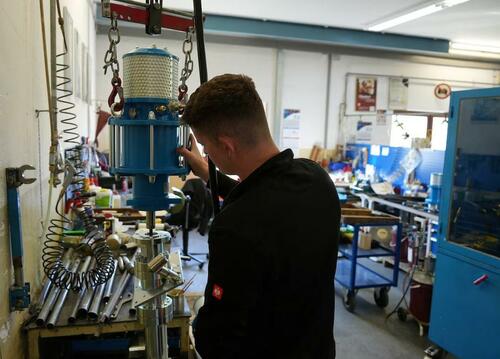Submitted by Thomas Kolbe,
The collapse of the German economy continues unabated. The German Engineering Federation (VDMA) now expects a dramatic decline in production this year and lashes out at the federal government.
A rebound in the German economy this autumn has failed to materialize. Just a week ago, the Federal Statistical Office revised the country’s GDP decline for Q2 2025 from –0.1% to –0.3%. Now, the German machinery association follows suit with its forecast for the full year, confirming the ongoing downward trend in production: “We had previously expected a decline of 2 percent, now we anticipate minus 5 percent for 2025,” says VDMA President Bertram Kawlath, who expects production to grow by just 1 percent in 2026. Was 2025 really the trough?
Kawlath Goes Political
Kawlath warns that the industry is facing a critical moment – both economically and socially. He describes the situation as a “tipping point,” where the economy is faltering and the political center continues to erode. “If action is not taken now, voters will be pushed into the arms of the political extremes,” he cautions.
Without explicitly naming them, the VDMA chief pointed to the AfD, which recently climbed to 27 percent nationwide in Sunday polls. Remarkably, even at this stage of the crisis, where the structural damage caused by ideology-driven policies is obvious, Kawlath speaks out politically for the first time yet still refrains from naming the culprit: the Green Deal’s ecological transformation is left untouched by his critique.
Meanwhile, the “silent cartel” of business elites continues to call for cosmetic deregulation and subsidies, rather than tackling the root of the problem.
Problems Are Now Impossible to Ignore
The issues are glaring: weak orders, crushing bureaucracy, lengthy approval processes, excessive taxes and labor costs, as well as severe location disadvantages in Germany. Add to that the massive burden of U.S. tariffs: roughly 40 percent of EU machinery exports to the United States are currently hit with a 50 percent duty on the metal content. Unstable, unpredictable rules, Kawlath says, force many companies to halt exports entirely.
He calls for lower taxes and levies, reduced bureaucracy, faster approvals – and above all, a stronger defense of German industry against Chinese competition. China, he points out, has not only caught up but also heavily subsidizes its industry, distorting global competition.
Industry Collapse
The situation continues to worsen. The VDMA’s optimistic forecast for next year is likely to be revised downward as no structural improvements are in sight. Meanwhile, policymakers remain in summit mode, with reforms nowhere in evidence.
If the predicted 5 percent decline in production for 2025 materializes, it would mark the peak of a catastrophic trend. Since 2018, machinery production – and roughly speaking, the entire German industrial sector – has fallen by about 20 percent. This has consequences for employment: over 200,000 industrial jobs have been lost since 2020, 68,000 of them just last year. And this may only be the beginning of a devastating employment crisis.
These figures no longer describe an ordinary recession but the onset of an economic depression. The core of the German economy, industry, has been severely damaged by the self-inflicted energy crisis and grotesque regulatory excesses under the Green Deal. It should not be forgotten that countless service sectors, supply chains, and value chains depend directly on industry. German prosperity fundamentally derives from this sector – the very source that supports social programs and helps maintain social stability amid a worsening environment.
Machinery accounts for roughly 3 percent of Germany’s GDP. With a 27 percent share of the global market, it ranks among the heavyweights of European industry. About one million highly skilled workers earn their livelihoods here – jobs once considered secure now caught in the storm.
Production fell by 7 percent in 2024, and a further steep decline looms for 2025. Orders dropped 8 percent year-on-year, and revenue forecasts continue their downward slide.
Germany’s Industrial Base Systematically Devalued
Under these conditions, industrial production in Germany is effectively impossible. Industrial electricity prices are roughly three times higher than in the U.S., a country actively promoting its manufacturing base, cutting red tape, and selectively supporting industry.
When Lower Saxony’s SPD economy minister Olaf Lies calls for subsidized industrial electricity amid the steel crisis and complains about cheap Chinese steel, it is little more than whistling in the wind. The exodus from Germany is already underway – and it is irreversible: once companies leave, they rarely return.
The steel sector is suffering particularly badly. It ranks among the most energy-intensive branches of German industry, and its subsidized dream of “green steel” has been buried after multiple bankruptcies. From machinery to chemicals, construction to steel, the same picture emerges: Germany’s industrial decline is accelerating unchecked.
What we are witnessing is an ideology-driven, systemic failure. Even U.S. tariffs cannot fix it: the problems have accumulated over years and are homegrown. Yet Brussels and Berlin stubbornly cling to climate fanaticism, dreaming their way through the crisis.
* * *
About the author: Thomas Kolbe, a German graduate economist, has worked for over 25 years as a journalist and media producer for clients from various industries and business associations. As a publicist, he focuses on economic processes and observes geopolitical events from the perspective of the capital markets. His publications follow a philosophy that focuses on the individual and their right to self-determination
Loading recommendations...
